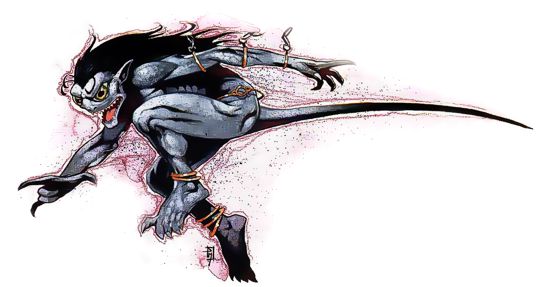The devetes are blue-skinned, humanoid creatures that wander the Astral Plane. Theyºre easily marked by their large, haunting eyes and long, swishing tails. They roam the Silver Void as if on some kind of arcane quest; a few graybeards claim that the devetes are actually searching for a means of returning to the birthplace of their race (see the “Ecology” section for the dark of a theory as to their origins). Most scholars, however, believe that the devetes have long since given up the search and have become a race without motivazion, emotion, or goals. And that makes them potentially quite dangerous, especially to a berk who has no idea what he’s getting into.
See, the nature of a devote depends on how its approached – literally. When it comes to emotions and mental outlook, the creature is a blank slate. If a basher advances on it spoiling for a fight, he’ll get one. If he comes looking for aid, he’ll find only need himself. This mimicry is an unconscions power of the devete. It can’t be peeled or tricked. If a bark pretends to be nice to a devote while secretly planning treachery, he’ll run into nothing but the same.
If a delete encounters multiple entities with different emotions and motivations, it simply copies one basher at random (or goes along with a majority. if one exists).
These strange creatures can communicate telepathically with any intelligent being. As far as anyone can tell, it’s impossible to successfully lie to a devete, or to hide any thought or fact from it.
Combat: Like many other monsters on virtually any plane, the devete attacks its foes with its claws and fangs. But the damage inflicted by these assaults depends on the ferocity of the attack – in other words, on the motivation and intent of the devete.
If a devete attacks out of fear, each claw inflicts 1d4+1 points of damage, and its bite another 1d3+1 points. When lashing out in pure self-defense, the devete inflicts 1d6 points with each claw and 1d4+1 points with its bite. If it strikes with malice or hate, each claw causes 1d8 points of damage, while the fangs inflict 1d6+1 points and drip a foul venom (the victim must make a saving throw versus poison or die in 1d4 rounds). And in all other cases, the damage per attack is simply 1d4/1d4/1d3.
All devetes possess an immunity to poison, paralyzation, and petrification. Further, elemental attacks – such as those involving fire, cold, and electricity – inflict only half their normal damage.
Habitat/Society: Normally, devetes lead solitary lives, meandering through the Astral Plane without any apparent aim or goal. Encounters with a wandering devete usually lead to strange events. Since the creature copies the motives and outlook of those around it, meetings with devetes are always different – and often confusing. It’s almost impossible for other beings to somehow “take advantage” of the devete’s mimicry, for the sods’ll soon find it taking advantage of them. The creature’s emotional adaptation is just too complete.
However, if a clever cutter understands the nature of a devete and wishes to influence it with his own emotional state, he can attempt to make a Wisdom check at -6 to successfully change his motivations/emotions. Bluffing and lying just don’t work. The bashers actually got to make himself happy, or sad, or whatever he wants the devete to likewise feel.
Sometimes, however, a planewalker runs across more than one of the creatures traveling together in a little clutch. When devetes gather like this, they act very, very differently. Fact is, they develop extremely xenophobic tendencies, looking to slay any other beings (intelligent or otherwise) they encounter out of sheer malice. The murderous devetes should be considered neutral evil in alignment, and their attacks always inflict the hate-based damage listed above (1d8/1d8/1d6+1) – including the poison dripping from their fangs.
Ecology: Chant has it that an intelligent race known as the kyleen once dwelled on the Outlands (in a gate-town where Xaos now stands) but traveled throughout the multiverse as traders, explorers, and planewalkers. Unfortunately, their downfall came when a great smith performed a grand experiment. He wanted to see if he could sculpt an entire palace out of karach, a dangerous, unstable, transmuting substance made from the chaos-stuff of Limbo itself.
The enormity of the berk’s hubris was matched only by the scope of his blunder and its ramifications.
Not only did the palace transform itself into something never seen before (or since) and then promptly disappear, but the whole event infected the kyleen with a strange chaos-plague. This rampant infection somehow spread through the race, eventually catching up even with members on faraway planes. Each victim of the disease slowly and painfully turned into an entirely new sort of creature, and when the chaos-plague had run its course, the sods all simply disappeared.
Some graybeards say that most of the mutated kyleen ended up on the Astral and became known as the devetes. However, a few folks claim that some landed on the Ethereal Plane, where they evolved into the mysterious creatures now called tweens.


